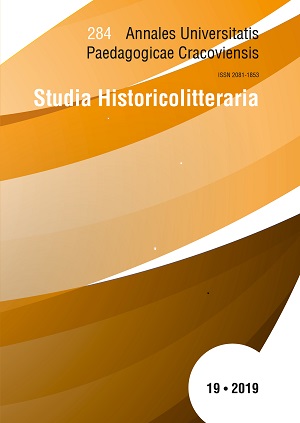'And here the reality is screeching...', or 'Na marne' and 'Z dobrego serca' by Lucjan Rydel
Main Article Content
Abstract
Two dramas by Lucjan Rydel 'Na marne' (1895) and 'Z dobrego serca' (1897) were created during the poet’s stay in Western Europe. These pieces are a testimony to changes in his worldview and attitude to life. He left in them his youthful fascination with symbolic and mood drama modeled on Maurice Maeterlinck’s plays. The attempts to transpose these patterns were heavily criticized by his youthful works 'Matka' and 'Dies irae'. Rydel turned to realism in art. In this case, the patterns were provided by Gerhart Hauptmann and Leo Tolstoy. Na marne is based on the confrontation of two life attitudes. The Major, a former insurgent, symbolizes patriotic tradition and deed, and his grandson Adam is a decadent who has lost faith in the meaning of life. It pushes him to suicide. This drama is a warning against passivity and fatalism. 'Z dobrego serca' treats about the sacrifice of a young girl who, after her sister’s death, decides to marry a much older brother-in-law to save her family. It becomes the personification of love of human being. For Rydel, the foundation on which we should build our life is Christian values. The choice made by the poet confirms his subsequent dramas mainly written for the folk theatre of which he was the initiator and creator.
Downloads
Article Details

This work is licensed under a Creative Commons Attribution-NonCommercial-NoDerivatives 4.0 International License.
COPYRIGHT POLICY
The publisher of "Annales Universitatis Paedagogicae Cracoviensis.Studia Historicolitteraria" is authorised to use and distribute all the materials published in the journal on the basis of a non-exclusive licence agreement unlimited in time – previously concluded for an indefinite period of time each time with the author of a specific paper in the fields of exploitation specified in the agreement.
OPEN ACCESS POLICY
"Annales Universitatis Paedagogicae Cracoviensis.Studia Historicolitteraria” is an open access journal, and all its contents are available for free to users and/or their institutions on the basis of non-exclusive licenses under Creative Commons (CC BY CC-BY-4.0). Users can read, download, make copies, distribute, print, search, or to link to full text articles in this journal without the prior permission of the publisher or the author.This is consistent with the definition of open access BOAI (http://www.soros.org/openaccess).
References
Brzozowska T., Lucjan Rydel. 1870–1918, [w:] Obraz literatury polskiej XIX i XX wieku, seria V: Literatura okresu Młodej Polski, red. K. Wyka, A. Hutnikiewicz i M. Puchalska, t. 2, Warszawa 1967, s. 197–207.
Dużyk J., Droga do Bronowic. Opowieść o Lucjanie Rydlu, wyd. 2 poprawione i uzupełnione, Warszawa 1972.
Jankowski E., Rydel: poeta „zaśmieszony”, „Przegląd Humanistyczny” 1959, nr 3/2, s. 133–139.
Leśniakiewicz I., Co zostało z Rydla, „Tygodnik Powszechny” 1968, nr 27, s. 4.
Listy L. Rydla do K.M. Górskiego, oprac. J. Dużyk, „Pamiętnik Literacki” 1971, z. 1, s. 171–227.
Listy Stanisława Wyspiańskiego do Lucjana Rydla, cz. 1: Listy i Notatnik z podróży, oprac. L. Płoszowski i M. Rydlowa, Kraków 1979.
Matuszek G., Dramaty naturalistyczne, Kraków 2001.
Olszewska M.J., Głos Lucjana Rydla w sporach o teatr ludowy. („Teatr wiejski przyszłości”, „Betlejem polskie”), [w:]
Młoda Polska w najnowszych badaniach, red. E. Jakiel i T. Linker, Gdańsk 2016, s. 87–118.
Olszewska M.J., Jeńcy – poetycka wizja historii według Lucjana Rydla, [w:] Wokół dramatu poetyckiego, t. 1, red. M. Gabryś-Sławińska i G. Głąb, Lublin 2017, s. 125–150.
Rydel L., Utwory dramatyczne, t. 1, Kraków 1902.
Tatarowski L., Wstęp, [do:] L. Rydel, Wybór dramatów, oprac. L. Tatarowski, BN, seria I, nr 247, Wrocław – Warszawa – Kraków – Gdańsk – Łódź 1983, s. III–CVI.
